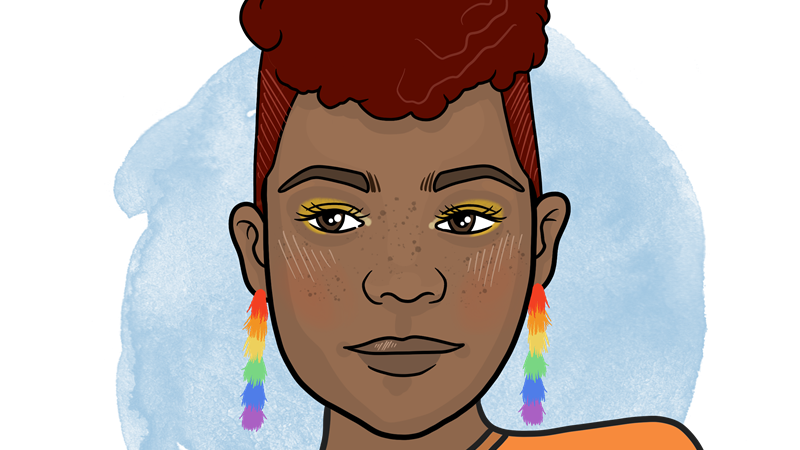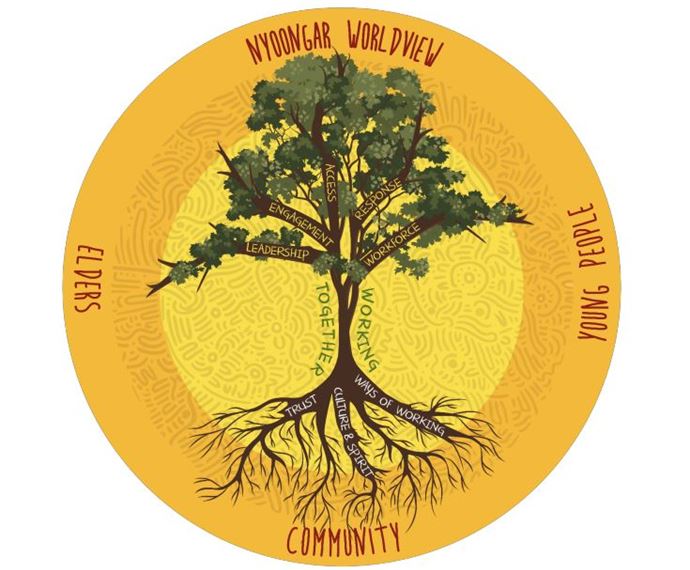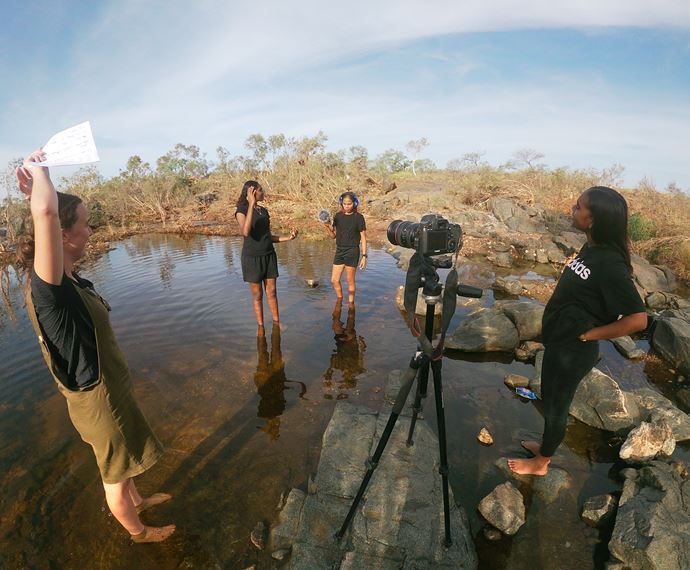The silence that is not named: Being Indigenous and identifying as LGBTIQ+
Led by Kurongkurl Katitjin, Centre for Indigenous Australian Education and Research at Edith Cowan University, this research explored how Aboriginal and Torres Strait Islander people living in Western Australia who also identify as Lesbian, Gay, Bisexual, Trans/Transgender, Intersex, Queer and other sexuality, gender, and bodily diverse (LGBTIQ+) navigate the intersection of being both Indigenous and LGBTIQ+.
The study explored Indigenous/LGBTIQ+ people’s experience and use of a range of health and social services and measured the extent to which their health, social and emotional wellbeing and other support needs were met.
The silence not named: Being Indigenous and identifying as LGBTIQ. This research study aims to understand the experiences and diverse needs of Indigenous LGBTIQ people, and work with mental health service providers to help them better respond to the mental health needs of this unique community. Funded over 2 years.
Edith Cowan University Joondalup
2/1/2019
Healthway
$46,210
Statewide
Aboriginal and Torres Strait Islander people, LGBTQIA+
- The study established an evidence base to inform policy and practice. It generated knowledge and insights that can be used to better understand how Indigenous people navigate the intersection of being both Indigenous and LGBTQI+.
- The research influenced practices within partner organisations.
- Research findings were communicated and disseminated widely, with information published in journal articles and made available in public reports.
- The initial exploratory research grant led to further funding and research.
- Extensive community consultation and engagement of Aboriginal elders was critical to the project’s success.
- The research being informed by ongoing community consultation, including individuals, groups and organisations.
- The research was led by Aboriginal and Torres Strait Islander researchers, including Indigenous/LGBTIQ+ researchers.
- The intervention of non-Indigenous ethics committees in determining safe and appropriate ways of conducting research.
- The automatic assumption of Indigenous/LGBTQIA+ vulnerability.
- Reach into regional and remote areas during COVID-19 related travel restrictions.

Opportunity
Research focusing on the intersection of Indigeneity and gender/sexual diversity is severely lacking. Similarly, very little information and guidance is available for services that work with people on how best to support someone who is both Indigenous and identifies as LGBTIQ+. Further, the current practices of those who deliver care to Indigenous LGBTIQ+ peoples are unknown.
The Indigenous/LGBTIQ+ community in WA is a relatively small population that experiences significantly poorer health outcomes than their peers. Aboriginal and Torres Strait Islander people experience poorer health and wellbeing outcomes than non-Indigenous Australians, including higher rates of self-harm and suicide [1] and chronic conditions [2]. Access to health services is reduced for various reasons, including a lack of accessible or culturally appropriate health services [2]. Racism negatively impacts the health outcomes of Indigenous people and affects how services are delivered to individuals [3, 4].
LGBTIQ+ people experience poorer mental health outcomes and have a higher risk of suicidal behaviours than their peers, due to experiences of stigma, prejudice, discrimination and abuse on the basis of being LGBTIQ+ [5]. LGBTIQ+ people also face barriers to accessing services due to perceived and actual experiences of discrimination and stigma [5].
Indigenous/LGBTIQ+ people experience discrimination in many ways, including racial discrimination and homophobia, which can result in the construction of double identity crises around culture and sexuality. This research set out to provide a safe space and voice around the issue of being both Indigenous and part of the LGBTIQ+ community. It was one of the first research projects to focus on the unique and complex experiences of those living at the intersection of being both Indigenous and part of the LGBTIQ+ community.
"We’ve just inferred [that] LGBTIQ+ communities have big health challenges, [and that] Aboriginal people do. [If] you layer [the health challenges] on top of each other, it must be a real concern…but this is the first time we’ve actually been able to have the data so we can demonstrate the problem properly, as opposed to just guessing what the issues may be." Professor Braden Hill
Breaking the Silence explored Indigenous/LGBTIQ+ people’s experience and use of a range of health and social services. It identified barriers and enablers in accessing appropriate and timely support, and measured the extent to which the health, social and emotional wellbeing and other support needs of Indigenous/LGBTIQ+ people are met. The research generated insights and recommendations regarding the provision of genuinely inclusive service responses for Indigenous people identifying as LGBTIQ+ to directly inform policy and practice.
Approach
This study used an Appreciative Inquiry (AI) strengths-based approach that avoids the deficit thinking that has defined past research with Indigenous people (6). The mixed-methods study was conducted in two phases.
In the first phase, data was collected from Indigenous and LGBTQI+ health and community organisations. To ensure representation from across organisations, staff working in WA health, community, family and social service and support organisations were engaged, including front office, clinical, support, administrative and executive level staff. Workshops were held with these staff to explore their experiences, strengths, and areas for improvement in working with Indigenous/LGBTQIA+ people. The workshops were followed up by a sector-wide survey. The aim of this phase was to identify how the findings can inform the design and development of professional development training, service delivery models and policies that can be embedded within the partner organisations and more widely in other organisations in Western Australia.
The Breaking the Silence research partners were:
- Sexual Health Quarters
- Yorgum Aboriginal Counselling Service
- Mootditj Koort (health and family services)
- Wungening Aboriginal Corporation (drug and alcohol service).
The second phase surveyed Indigenous/LGBTQI+ people living in WA about their experiences at the intersection of Indigeneity and LGBTQI+ identities.
63


Indigenous/LGBTIQ+ people living in WA aged 18 years and over were surveyed
206


Staff working in WA health, community, family and social service and support organisations were surveyed
56


Participants in five focus groups including staff working in WA health, community, family and social service and support organisations
“This project was progressive and was really pushing the boundaries of what research has done in the past. It has led to a whole range of really important work that’s going to be of benefit to the Indigenous community nationally.”
Professor Braden Hill
Impacts and outcomes
The Breaking the Silence study established an evidence base to inform policy and practice. It generated unique knowledge and insights that can be used to better understand how Indigenous people navigate the intersection of being both Indigenous and LGBTIQ+ and to guide the provision of genuinely inclusive service responses. Knowledge generated includes:
- Health and wellbeing needs and concerns of Indigenous/LGBTIQ+ communities.
- How Indigenous/LGBTIQ+ people experience and use a range of mental health, sexual health, education, family and community support organisations.
- Factors including individual, family, cultural, organisational and systemic factors that enable or prevent Indigenous/LGBTIQ people from accessing services (e.g. service characteristics and activities).
- The role families play in supporting Indigenous/LGBTIQ+ people to come to terms with sexual and cultural identities, and access a range of health and support services.
- Current practices, confidence, knowledge, and training needs among Western Australian health and community service workers working with Indigenous/LGBTIQ+ clients.
- How all levels of a range of organisations respond to the needs of Indigenous/LGBTIQ+ people and the establishment of a baseline for how services are currently delivered to this group, including identification of gaps in services and areas of unmet need.
- Identification of responsive, inclusive, and Indigenous/LGBTIQ+ culturally appropriate and safe service delivery models, processes, referral pathways, professional development training and policy responses and practices that can be embedded in WA health, education, and social services to more effectively meet the needs of Aboriginal and Torres Strait Islander who identify as LGBTIQ+.
The research influenced practices within partner organisations, including:
- Highly visible signs and symbols (Aboriginal and Pride flags, posters and artwork) displayed throughout the organisations, particularly in main reception areas.
- Service intake processes updated to identify and capture data on Indigenous LGBTIQ+ clients.
- Comprehensive staff development and upskilling about inclusive language and terminology, and strategies, processes and policy responses that can respond effectively to the needs of Indigenous/LGBTIQ people.
- Development of respectful protocols and strategies for engaging with Elders and senior Aboriginal Board Members in the development of service models that meet the needs of Indigenous/LGBTIQ+ clients.
"One of the big things was…when we asked them about how do you know when your clients are LTGBTIQ+…these were drug and alcohol services, psych counselling services, general medical services, sexual health clinics…basically most of the Aboriginal organisations said we don’t ask. We don’t ask the question. So a lot of them changed quite immediately their demographics intake to make sure that LGTBIQ+ was considered as part of that process, training around appropriate terminology, and that actually for the first time allowed them to track queer clients coming into their service, whereas before that we used to say, we don’t know if anyone actually comes here. Giving them that guidance was really important." Professor Braden Hill
The research delivered immediate community benefits for Indigenous/LGBTIQ+ people with the promise of additional benefits in the future, including:
- Affording a safe space for the voices for Indigenous/LGBTIQ+ individuals, who have for the first time been able to ‘break the silence’ and safely describe their experience of living in the WA community as both Aboriginal and LGBTIQ+ and how a range of services and online resources can be improved to better support them.
- Providing confirmation of support for Indigenous/LGBTIQ+ people from Elders and Senior Aboriginal Leaders from the Noongar Community. This provides an opening for conversations between CEOs and Board Members of Aboriginal led organisations.
Research findings were communicated and disseminated widely, with information published in journal articles and made available in public reports that were launched at a community event and distributed to all Indigenous led organisations in Western Australia. See additional information below for links to reports and journal publications associated with this research.
The Exploratory Research Grant contributed to research capacity within WA by:
- Building capacity of the Indigenous research workforce who led the study.
- Increasing understanding on the intersection of Indigeneity and gender/sexual diversity.
- Generating additional research revenue.
“From this relatively small study has emerged some really important national studies that have accelerated the conversation nationally about the ways in which the health sector can and should respond to the concerning health outcomes of Indigenous/LGBTQIA+ people. This scaling up has seen an important growth in the leadership of Indigenous Queer researchers conducting safe and respectful research with and for their communities.”
Professor Braden Hill
This initial exploratory research grant has led to further funding and research, including:
- A grant from the Department of Health WA to explore workforce training needs, develop an organisational training package, and operationalise the recommendations for Indigenous/LGBTIQ+ inclusivity with WA organisations.
- National Health and Medical Research Council grant to scale up the work nationally and expand focus to include youth demographic (14-25 years). See Walkern Katatdjin Rainbow Knowledge.
What worked
Extensive community consultation and engagement of Aboriginal elders was critical to the project’s success and included Elders Yarning Groups. The research was informed by ongoing community consultation, including consultation with Indigenous elders and senior people who identify as part of the LGBTIQ+ community, and Indigenous professionals and workers currently providing services in this area. Significant consultation occurred with Aboriginal and Torres Strait Islander organisations and other organisations providing health, community, counselling, educational, sexual health and wellbeing services to Aboriginal and Torres Strait Islander people in WA.
Importantly, the research was led by Aboriginal and Torres Strait Islander researchers including Indigenous/LGBTIQ+ researchers. Indigenous and LGBTIQ perspectives were also prominent in the Advisory Group that provided oversight and guidance to the research team, with more than seventy per-cent of Advisory Group members Indigenous and/or identifying as LGBTIQ+.
Key challenges
A challenge for this project was the involvement of non-Indigenous ethics committees in determining what was safe and appropriate ways of conducting research. Due to committee views, the ‘community first’ design of the project had to be re-considered to the frustration of the Indigenous researchers who have first-hand knowledge of their community’s needs. The assumption of Indigenous/LGBTQIA+ vulnerability is problematic, and needs a re-think when research is conducted by those with lived experience and connection to the community they are working with and for.
Another challenge for this project was reach, particularly into regional and remote areas. Restricted travel meant visits to regional areas was not achievable. While the use of paid social media for the survey in community was helpful, it did not reach a diverse profile in terms of ages. Much of the sample was skewed towards people under the age of 40.
Additional information
Reports and journal publications associated with this research.
REFERENCES
- AIHW. Deaths by suicide amongst Indigenous Australians: Australian Institute of Health and Welfare; 2022 [Available from: https://www.aihw.gov.au/suicide-self-harm-monitoring/data/populations-age-groups/suicide-indigenous-australians.
- Australian Government. Status and determinants of Aboriginal and Torres Strait Islander health: Department of Health and Aged Care; 2021 [Available from: https://www.health.gov.au/topics/aboriginal-and-torres-strait-islander-health/status-and-determinants.
- Ferdinand A, Paradies Y, Kelaher M. Mental Health Impacts of Racial Discrimination in Victorian Aboriginal Communities: The Localities Embracing and Accepting Diversity (LEAD) Experiences of Racism Survey. Melbourne: The Lowitja Institute; 2012.
- Paradies Y, Ben J, Denson N, Elias A, Priest N, Pieterse A, et al. Racism as a Determinant of Health: A Systematic Review and Meta-Analysis. PloS one. 2015;10(9):e0138511.
- LGBTIQ+ Health Australia. Snapshot of Mental Health and Suicide Prevention Statistics for LGBTIQ+ People. 2021.
- Bellinger A, Elliott T. What Are You Looking At? The Potential of Appreciative Inquiry as a Research Approach for Social Work. British Journal of Social Work. 2011;41:708-25.
- Haswell MR, Kavanagh D, Tsey K, Reilly L, Cadet-James Y, Laliberte A, et al. Psychometric validation of the Growth and Empowerment Measure (GEM) applied with Indigenous Australians. The Australian and New Zealand journal of psychiatry. 2010;44(9):791-9.
Learn about wellbeing
Understand how your community is going to help you to better target and plan your project.
Ready to plan your project?
Understand your vision, plan your impact and report on the outcomes of your project with three easy interactive tools in the Community Impact Planner.
Acknowledgement of Country
The Western Australian Community Impact Hub acknowledges and pays respect to the Traditional Owners of the land on which we are based, the Whadjuk people of the Noongar Nation and extends that respect to all the Traditional Owners and Elders of this country. We recognise the significant importance of their cultural heritage, values and beliefs and how these contribute to the positive health and wellbeing of the whole community.


